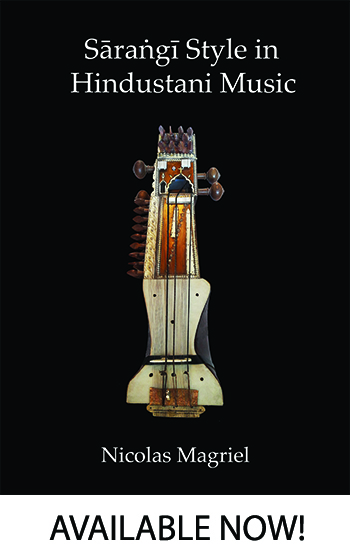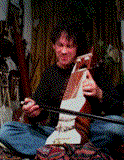 the eminent vocalists Vinayakrao Patwardhan and Vasantrao Deshpande who eventually sent him to Mohammed Khan, the famous Jajar-gharana sarangi player, to learn sarangi. During my first visit he burst into tears—of love—when I said that I had learned from the great master Gopal Mishra. We became very good friends during several visits to Pune between 1997 and his death around ten years ago. He taught me many bandishes and interesting ways of forming tans. He was unusually articulate and thoughtful about music. He was elderly and out of practice on sarangi, but his singing was still well-oiled by ongoing teaching. And he had a very beautiful and well-maintained sarangi, similar to that of Baccha Lal Mishra in Banaras.
the eminent vocalists Vinayakrao Patwardhan and Vasantrao Deshpande who eventually sent him to Mohammed Khan, the famous Jajar-gharana sarangi player, to learn sarangi. During my first visit he burst into tears—of love—when I said that I had learned from the great master Gopal Mishra. We became very good friends during several visits to Pune between 1997 and his death around ten years ago. He taught me many bandishes and interesting ways of forming tans. He was unusually articulate and thoughtful about music. He was elderly and out of practice on sarangi, but his singing was still well-oiled by ongoing teaching. And he had a very beautiful and well-maintained sarangi, similar to that of Baccha Lal Mishra in Banaras.
Listening to these videos more than 20 years later, I'm astounded by his openness and kindness and his profound knowledge of both sarangi and vocal music.
We start with some pieces from a visit on December 12th, 1996. First he played Shri Rag, preceeded by some discussion:
Next was rag Pilu in thumri style:
Then Kharilekarji sang three very interesting bandishes:
Followed by rag Todi and more discussion:
I returned on December 16th (added January 2025), and we had a wonderful time with rag Darbari:
Followed by rag Madhuvanti:
Then Karilekar taught rag Yaman to his young student Dipti:
(Now 11 more videos added January 2025)
I next arrived in Pune on February 4, 1997. First Kharilekarji unveiled rag Jaijaivanti:
Then Kharilekar sang some songs in talim notebooks from his youth: rags Sarasvati, Jajaivanti again, Adana and a tarana in Todi:
I visited again the next day, February 5th in the morning. We started with sarangi talim in rag Asavari:
Then Bhairavi, including complex chromatic tans:
Kharilekarji examined my sarangi and made some comments. I tried his beautiful instrument (Alhaiya Bilaval). The strings were low, so it was clear that his habit was to play entirely on his nails. Then he taught his lady vocal student Lalit (possibly at her house):
The next day, February 6, 1997, we played Todi:
I returned to his place on the 7th of February and we started with some wonderful sarangi talim in rag Patdeep:
Next we explored some songs from books—rags Todi and Jaijaivanti:
Then Kharilekarji treated me to some beautiful teachings in Piloo followed by a famous tappa in Kafi:
The next videos are from February 15th, 1997. It was dark in the room, so we don't see Madhukar Kharilekar's face very well, but it's a wonderful record of how this man was bursting to share his knowledge. The first piece is a lesson in rag Bageshri, sung and played, interspersed with and followed by conversation:
The next video from the same long day includes rags Bhairavi, Kafi and Saraswati and more discussion:
And then we have a wonderful vocal lesson in palta tan formation in rag Yaman, followed by a little bit of his young student, Dipti, on sarangi. Sadly she eventually abandoned sarangi.
(added autumn 2024) Now we jump seven years to 2004. I made two visits to Pune—in February and March 2004, and on these occasions I left my sarangi in Bombay, determined to deepen my vocal experience, already being fostered by Batuk Dewanji and Aslam Khan in Bombay. Here I present a series of long videos, reflecting the many hours I spent with Kharilekarji during these visits. Although he was in his 70s, his stamina was boundless. The media has graduated from Hi8 to digital standard-definition video.
All these videos are of Madhukar Kharilekar teaching me singing. This is an intenive record of a sarangi player's depth of vocal knowledge. I must remind the reader that starting in childhood Kharilekarji was trained in vocal music by the great singer and scholar Vinayakrao Patwardhan as well as by Vasantrao Deshpande. Eventually, when Kharilejarji was around 18, Patwardhan ordered him to take up sarangi and sent him to Mohammed Khan. This decision is a little hard to understand. Kharilekarji seemed to believe it was because Patwardhan perceived the need for sarangi accompanists who were more deeply conversant with the nuances and compositions of vocal music. However, despite the depth of his knowledge, Madhukar Kharilekar never became famous as an accompanist.
And he never became a performing vocalist. Nevertheless these videos unveil an incredible depth of knowledge and at times staggering speed and complexity in his vocal utterences. Watching these videos in 2004, I am astounded by the openness and love with which he taught me—this was a sort of musical reparenting. And I'm ashamed that life's twists and turns and my own stupidity prevented me from consolidating the knowledge which Kharilekarji imparted to me.
We begin with rag Todi taught on February 21, 2004.
This was followed by rag Kamod, including the famous bandish "jaane na dungi".
I returned on the 23rd, and we sang rag Lalit.
He then showed me a tarana in rag Adana and a tarana in rag Todi.
After an intense three days in Pune (including the 22nd spent visiting Girija Devi at her student's home there and attending her concert), I returned to Bombay where I was living at the time. I went back for a longer stay in Pune in March. First was a lesson on March 16, 2004 in rag Multani:
Then on the 17th we sang the fairly rare rag Shivmat Bhairav:
Followed by rag Ramkali:
And then Ahir Bhairav:
On the 18th we sang rag Gaud Malhar briefly:
Then rag Malkauns:
And short glimpses of rags Yaman and Shri:
On the 19th we had a long sitting exploring rag Kedar:
Then an interlude in Alhaiya Bilaval, followed by another bandish in Kedar:
On the 20th Kharilehar gave me some advice on my musical trajectory, and then we had a look at rag Chayanath:
This was followed by a long exploration of the somewhat eerie pentatonic rag Madhukauns:
Finally from my last visit to Pune on February 15th, 2005, more gems from Madhukar Kharilekar. What a sweet man! First a singing lesson in rag Malgunji, a vilambit bandish favoured by the Gwalior gharana (which I have listened to many times sung by Gajananrao Joshi) "bana men charaavata". Towards the end of the session Kharilekarji flows into the rare but beautiful rag Shivmat Bhairav:
Then Kharilekarji demonstrated an impressive tappa and some interview. Kharilekar tells me about learning vocal music as a boy from Vinayak Rao Patwardhan and Vasant Rao Deshpande at the Gandharva Mahavidyalays and also at their homes. Patwardhan siad that every vocalist should know how to play at least two instruments,so he learned dilruba, violin and harmonium. But he really wanted to learn sarangi so Patwardhan sent him to Mohammed Khan. It was fairly easy for him because he already had all the rags in his head.
The last item of the day was an ektal tarana in rag Todi. Again the camera takes us both in, and we get a good impression of rhe intimacy of musical transmission—such an intense memory for me:
I said I would return to Pune in two or three weeks. I'm not sure if this happened...



